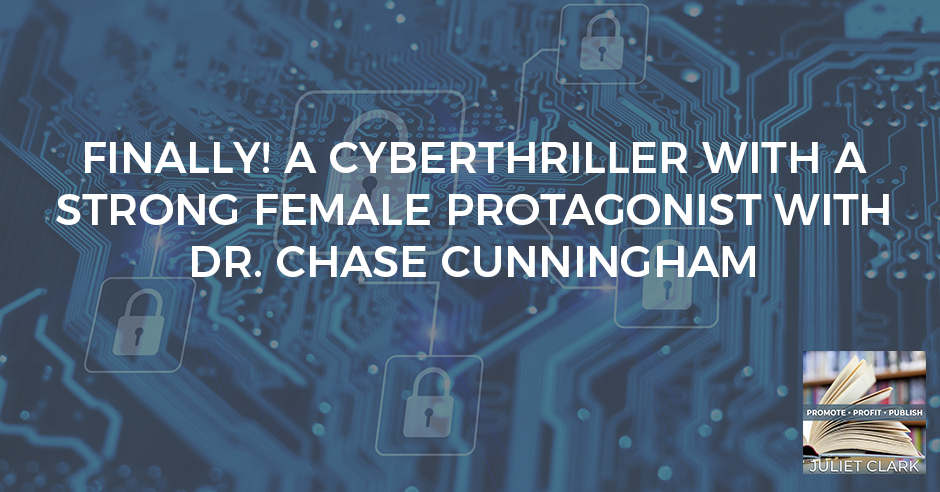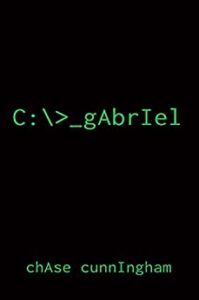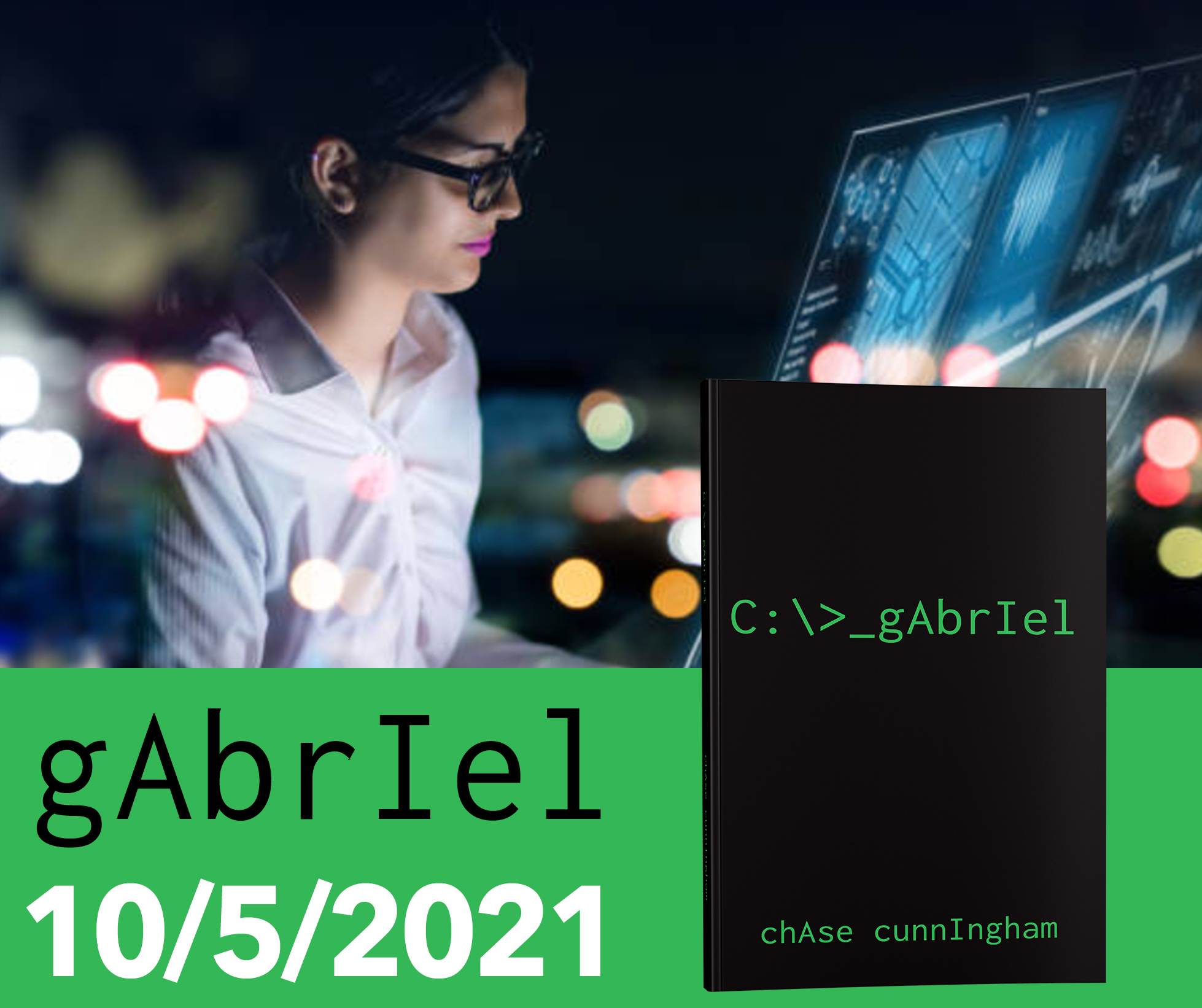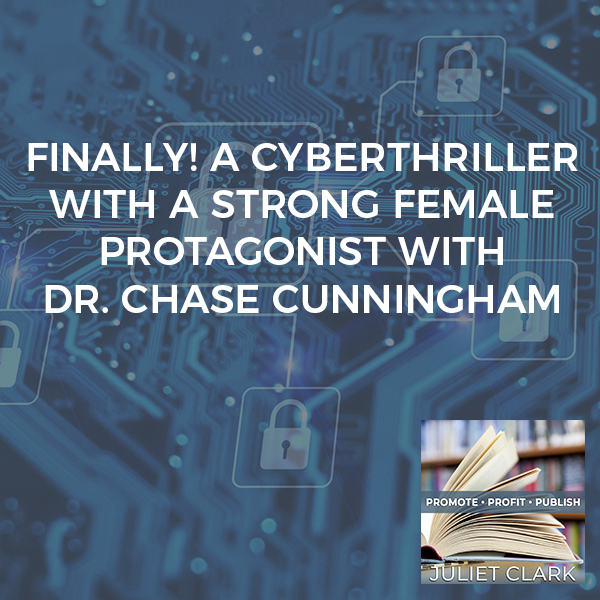
Women’s intuition is a real thing. And it’s crucial for a strong female protagonist to hone in a world of cyberthreat. Juliet Clark interviews Dr. Chase Cunningham, a cybersecurity expert and the noted creator of the Zero Trust Extended Framework, about his cyberthriller that puts women at the forefront. Also, Dr. Chase explains how dangerous AI can be if we don’t know how to protect ourselves.
Do you know you’re being tracked right now and at every moment? You carry a tracking device with you everywhere you go, and yes, it’s your cellphone. Join in the conversation to understand the urgency of cybersecurity. And how thrilling Gabriel’s story is as she defends herself from cyberthreat. Tune in!
—
Watch the episode here
Listen to the podcast here
FINALLY! A Cyberthriller With A Strong Female Protagonist With Dr. Chase Cunningham
We have a guest who is one of my authors who has released a fiction novel that is very relevant nowadays. He’s holding it up already. He’s pretty excited about it. Before we go there, I want to remind you, go over and take the Promote Profit Publish quiz at www.PromoteProfitPublishQuiz.com. Find out if you are ready to get that book out to the world. There’s a lot that needs to be done. I know a lot of you think writing is the hard part. Guess what? Publishing and marketing are the hard part. Also, don’t forget to go over to our YouTube channel, Superbrand Publishing and subscribe.
Our guest is Chase Cunningham. Chase is a noted Creator of the Zero Trust Extended Framework. He is a cybersecurity expert with decades of operational experience in the NSA, US Navy, FBI Cyber and other government mission groups and the co-author of The Cynja Comic Series, Cyber Warfare – Truth, Tactics and Strategies and the host of DrZeroTrust podcast on Spotify.
Chase was previously a VP and Principal Analyst at the Forrester Research, Director of Threat Intelligence for Armor, Director of Cyber and Analytics for decisive analytics and Chief Cryptologic Officer for the US Navy. Welcome, Chase. That is quite a tongue twister. I should have to practice that. I didn’t realize it was going to be so difficult.
Through a lot of acronyms, sorry.
The acronyms were easy. It was those big words. Typically, I’m a hick so no words over five letters. I’m excited about your new book because when we first talked, the first hack that affected people in the United States, the colonial pipeline, had literally happened. I was excited about the relevance of the book and I was excited about a prophetic thing that you told me about, “We’re going to see this more.” Also, a little bit about that and why this book is so relevant. What’s going on in the world that this hit?
Ransomware is now being dubbed by the administration as a national security threat. If you’re not familiar with ransomware, that’s where someone takes your computer over and locks it up and then says, “If you want your stuff back, you got to send me money.” Funny enough, if you looked at the amount of money that ransomware operators made in 2021, it’s the third-largest economy on planet Earth. It’s crazy.
Then on top of that, we’ve started to see these attacks on critical infrastructure. For me, in the book, I wrote about an attack on a water plant. I wrote about it and maybe two weeks later, it happened. I told my wife. It was one of those I told you so moments. You, as a husband, don’t get those very often. I got to say, “I told you so this can happen and sure enough, it did.” Everything that I’m writing about here is technically possible, technically accurate, and unfortunately, highly probable.
Ransomware happens when someone takes over your computer, locks it up, and then says, “if you want it back, you have to send me money.”
One of the things that impressed me when I first talked to you is your main character here is a female. Can you talk a little bit about that and why you chose her?
Number one, we have a labor shortage noted in the cybersecurity industry. We need more people that aren’t from your typical background like me. I’m, I guess you’d say, standard. An ex-military guy that came out of the South and worked in technology. We need people that aren’t from that neck of the woods. We need people that aren’t military. We need lots more women in the space.
I wanted to write a book from my personal experiences with women in the military and show like, “It’s just a bunch of men running around in here doing cyber things.” We have powerful women and we have a significant need for them. I was trying to champion that message and say, “Come do awesome things with us in this space.”
Ladies that talk about STEM, for mothers that are reading, we probably don’t have a younger crowd but the importance of those that the STEM being pushed in schools.
Everything now is technology-based. People forget that we have an entire generation of people coming into the workforce that has never known a day in their life without wireless. They don’t know how it works. They have never been a day in their life without wireless technology. STEM is going to be increasingly important in our kids, families, moms, everyone. We’re all connected. We’re all using the internet all the time. It’s very important we understand that there is a darker side to this thing. If you don’t know what you’re doing like in any other space, it can be dangerous.
That is so true about our kids. I remember telling my son about it. I was always the teacher’s pet. I love doing the machine that does the stencils and the ink. That’s how we made copies before xerox. I can still love this. Even you, you’re like, “They always have a copy machine.” We had these machines where you would type the assignment or whatever it was. Put it on a roller that had the ink on it and round in circles. It would make our copies. Imagine handouts in class. That’s how teachers used to do them. That’s why they had all this child slave labor and teacher’s pet to do the copies.
For COVID, the city issued my kids laptops. The funny thing was, they sent them the laptops home. Me as a security guy, the first thing I did was look at them. I was like, “These are terrible. This is woefully insecure and they’re giving it to my children.” I tried to tell the School District Leadership about it and they honestly blew me off. Part of the problem I’m trying to get in front of people is it’s not enough to have these laws a fair approach to things and go, “I don’t know about it so it can’t be a problem.” We need to know, understand and be prepared.

gAbrIel
That goes back to two. When my kids came home and all of a sudden, they had Gmail accounts. They were submitting things through Google Docs. I had a fit about that because I’m like, “Google is literally profiling you at this point.”
You’re the product. That’s how remind people all the time now. You have a tracking device with you 24/7 and it’s called your cell phone. The cell phone company knows more about you than I ever did working at the NSA or FBI. That’s what all these applications are doing is they’re making money off of your interactions. Unfortunately, you’ve consented to that.
Why am I no longer on social media except for LinkedIn? For just that reason I got tired of being the product of everything. One of the things that we talked about with your woman, the person that was the protagonist of the story. I love this, too. You feel that women are better at this cybersecurity because of their intuition. Do you want to expand on that?
I’ve got two daughters. I grew up around a whole lot of women. All of them were strong-minded, strong-willed, I guess you’d say. What I’ve learned being in the space for a long time is the guys are the harder ones to spin up because men take things at face value. We typically, look at it from a logical perspective. If it doesn’t logically fit then it probably doesn’t make sense.
Whereas when you work with a woman, women’s intuition is a real thing. The fairer sex is better at putting a puzzle together and coming out with an analytic leap rather than going, “This doesn’t make sense because it doesn’t fit into the mold.” You can’t do better, honestly, than having a woman in cyber. We need more of them.
Tell us about some of the threats because you said all of this is real. You sent me the most incredibly scary video from Joaquin Martin. I shared it with all of my friends that I don’t think people realize. I want you to share some of these scenarios like the water you already did. Also, that you’re relying on a lot of people to be very ethical with this. In fact, entire countries that aren’t.
We are engaged in Cold War 2.0 whether you realize it or not. The Cold War went digital. It didn’t go away. It just changed into a digital space so we’re engaged in that. We are at it. There are no adversaries and allies. We are going with our friends like they’re going with us. We are constantly teetering on that razor’s edge that if someone screws up, something bad could happen quickly. I’m literally including nuclear capabilities, which should scare the heck out of people.
You have a tracking device with you 24/7; it’s called your cell phone.
I’m not doing this for the sake of a fantasy. This is a reality. I lived and breathed this. The other thing that we need to remember, too. We have this idea in the combat space. If I pick up a gun, I have to look at someone, squeeze the trigger and engage the target. Hopefully, I hit what I’m aiming for. In the digital space, if I keystroke something and I’m not paying attention. I could inadvertently cause cataclysmic outcomes. There are no safeties in cyberspace. That’s part of the problem. It shouldn’t be something that folks aren’t necessarily scared of but they should dang sure be aware of it, in my opinion.
I’m going to call them microdrones, the video you sent me.
It’s Slaughterbots.
Talk a little bit about that because what struck me about that, not only that it was super scary but we’re relying on everybody being a good citizen in a scary world.
If you can imagine, you can take artificial intelligence, facial recognition, drone technology and put a little 9-millimeter warhead on that thing. You could off and tell it via a program, “Slaughterbot, go off and put that 9-millimeter shell through this person’s skull.” That’s what they show in the video that this is technically possible.
That’s scary because then you start thinking about, “Who’s sitting behind the keyboard here making the decision on who gets the shell through the forehead?” It gets out of control quickly. I wrote about some drone scenarios in my book because there is a drone. I hate flying and there’s a drone scenario that scares the hell out of me. I had to write about it because I needed to get it out. It was cathartic but it’s a very real scenario and it is something that should be concerning as well.
I remember reading a fiction novel several years ago where we’re expecting this big drone up in the sky like we see somebody on the field. They talked about the micro. It can look like a bee, a bird. You have no idea who’s surveilling you or if that thing up there is real. Another thing in the book is you talk about AI. For most of us, we don’t truly understand artificial intelligence. In your book, it runs amuck. Can you talk a little bit about that because when you’re saying this stuff is real, all of that is pretty scary?

Strong Female Protagonist: Women’s intuition is a real thing. We need more women in cybersecurity.
Elon Musk quoted the saying, “We don’t want AI.” I would follow them up and say, “We don’t want AI either.” That’s not something that would be beneficial to mankind in the long run. I don’t mean in the James Cameron Terminator side of things but I do think people should understand. What we have in the market is what you would consider to be machine learning, which is basically powerful algorithms with a lot of processes and compute that come out with a beneficial outcome. Nothing crazy amazing there. It happens.
If you go on Facebook and you say, “I love my new sneakers,” then over on eBay, you get an email for new sneakers. That’s ML, that’s what makes that happen. Whereas AI is you have good math, good processing compute and you apply it with enough horsepower that the machine starts making its own decisions. It’s not aware. It’s not how from that Space 2000, the Kubrick movie or whatever. It is a decision-making engine that’s deciding for itself. Like you have with anything in life, kids when something that is aware starts making its own decisions, you may not like the decisions it makes.
Also, when you drop a certain word in your house and suddenly it’s been parroted back to you.
You tell your child like, “Don’t do that,” and they do it anyway out of spite. That’s the thing we’re talking about here.
That is what gAbrIel is about. It’s something that was developed and then you thought it was dead. It came back and hunted everything.
gAbrIel was developed by the government. They did it as a research project, which is what happens a lot of times. They say, “This is a bad idea. Let’s shelve it,” and they didn’t do it the right way. gAbrIel is able to get out. That’s when things go bad.
The operative word there too, was Math. I remember reading Weapons of Math Destruction and being blown away because people don’t realize that. There’s a lot out there about Math is racist or whatever it is. Math is in every single thing we do on the planet. The chair you sit and the car you drive, the house you live in. Talk about the strong Math and how that all fits in.
In AI’s case, speed is the enemy. You don’t want AI to make decisions quickly because it’ll beat humans to the punch.
In this particular instance, basically, the idea that the government had was, “Can we run powerful algorithms and say, ‘Let’s see if this thing looks at a certain type of content,’” then uses Math to make its own inferences about what it thinks about the content. It’s doing that based on an algorithm, based on a formula. That works fine for a little while but what you realize is if you give something different data that it doesn’t necessarily know about, it might start chewing on it and coming out with decisions that don’t make it. It’s all based on Mathematics. The better the Math is, the better the outcome will be. In this case speed, it can be the enemy. You don’t want this thing making decisions quickly because it’ll beat humans to the punch.
First, strip cyber thriller for you but you have written some other books. I know we’re going to tell people where to get gAbrIel but talk about the other books because you have a strong interest in getting children involved in this early.
I’ve co-authored three comic books for kids and families on cybersecurity. I will send you a series. It’s in four languages. It’s been cool every once in a while, I get an email from some kid overseas that says, “I had a Cynja birthday.” It’s to get them to understand the cooler sides of what is going on in this space without it being telling them from a computer scientist’s perspective. It’s a comic book. Who doesn’t want to read comics?
Who wants to listen to a computer scientist? I don’t have the engineer brain. I remember being at an event, an entrepreneurial event and a mechanical engineer was explaining his product to me. I was like, “Where’s the coffee? I’m going to fall asleep.” I don’t get Math as a creative person. I’ve never been super good at Math. Where did we find gAbrIel? Where do we find you? You have a podcast. Where can we find that podcast at?
It’s on all the popular forums. It’s on iTunes, Google Podcast, Spotify. It’s DrZeroTrust. That’s me. You can also look up the book on Amazon. It’ll be out there on the 5th of October. If you’re looking for me, I’m pretty easy to find on LinkedIn and Twitter. I’m the only Chase Cunningham with a comic book avatar.
It’s easy to find. Also, too, I want to mention. There was a press release done about the book. It was released when we are recording and has been picked up by associated press MarketWatch and several other outlets. This is going to be good. A lot of people are going to know about it.
That’s the hope. For me, this is about awareness and letting folks know that there is a darker side to technology and making sure that it’s also grounded in reality. If I have one person read it and ping me and say like, “You woke me up to this whole other side of the equation,” then I call that a win.
I had to read the book, of course since you published it. It’s a super easy read. It’s a good thought, cyber-thriller. I encourage you to go over and check it out. Over on Amazon, Gabriel. It will be out in Kindle and in softcover. What a hold that covers up again?

Strong Female Protagonist: Elon Musk says, “we don’t want AI.” We should follow up and say, “we don’t want AI either.”
I’ve got the only one in existence now.
Thank you so much for being and thanks for bringing awareness to these big problems.
Thank you for everything. Thanks for helping my book not be terrible.
You’re welcome.
Important Links
- www.PromoteProfitPublishQuiz.com
- Superbrand Publishing – YouTube
- Zero Trust Extended Framework
- Cyber Warfare – Truth, Tactics and Strategies
- Dr. Zero Trust – Spotify
- Weapons of Math Destruction
- gAbrIel
- Cynja
- iTunes – DrZeroTrust
- Google Podcast – Dr.ZeroTrust
- DrZeroTrust – Spotify
- LinkedIn – Chase Cunningham
- Twitter – Chase Cunningham
- MarketWatch
About Chase Cunningham
 Chase is noted as the creator of the Zero Trust eXtended framework, a cybersecurity expert with decades of operational experience in NSA, US Navy, FBI Cyber, and other government mission groups, the Co-Author of the Cynja comic series, Cyber Warfare-Truth, Tactics, and Strategies, and the host of the DrZeroTrust podcast on Spotify. Chase was previously A VP and Principal Analyst at Forrester Research; Director of Threat Intelligence for Armor; Director of Cyber Analytics for Decisive Analytics; and Chief Cryptologic Technician, US Navy.
Chase is noted as the creator of the Zero Trust eXtended framework, a cybersecurity expert with decades of operational experience in NSA, US Navy, FBI Cyber, and other government mission groups, the Co-Author of the Cynja comic series, Cyber Warfare-Truth, Tactics, and Strategies, and the host of the DrZeroTrust podcast on Spotify. Chase was previously A VP and Principal Analyst at Forrester Research; Director of Threat Intelligence for Armor; Director of Cyber Analytics for Decisive Analytics; and Chief Cryptologic Technician, US Navy.
Love the show? Subscribe, rate, review, and share! https://superbrandpublishing.com/podcasts/









Leave A Comment